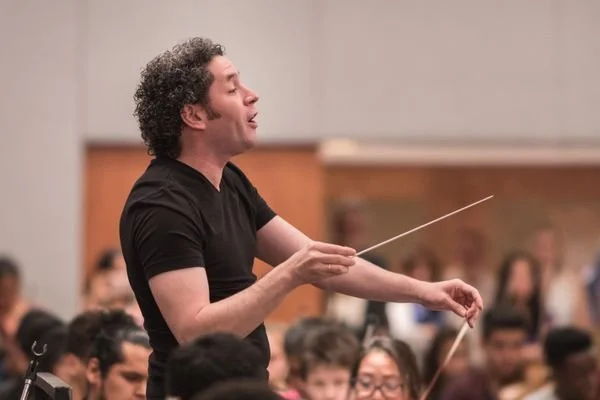¡Viva Maestro! captures the power, and politics, of Venezuelan conductor Gustavo Dudamel, now playing
Documentary follows the celebrated talent as he prepares his young orchestra for a tour—and as his home country falls into chaos
¡Viva Maestro! is now playing at International Village cinemas.
IT’S OFTEN CHALLENGING FOR a film to capture the talent of a standout conductor. That’s definitely not the case with director Ted Braun’s new documentary ¡Viva Maestro, the latest in The Impact Series, focusing on charismatic, curly-headed Venezuelan maestro Gustavo Dudamel.
His genius and passion is most evident in a sequence where he works with his young orchestra on the first, famous notes of Beethoven’s 5th. From a so-so beginning, he builds the players to a triumph of power, clarity, speed, and the feeling that his musicians are playing for their lives—all within minutes of coaching them. As one musician says, “When he gives us instruction, he rarely says a technical thing like ‘shorter’ or ‘faster’ or ‘longer.’ It’s always, ‘I want it to feel like this.’”
The rehearsal takes place as Dudamel travels to Caracas in 2017 to prepare that city’s Simón Bolívar Symphony Orchestra for a tour of Beethoven’s nine symphonies to Vienna and Hamburg. What we are told, but he doesn’t yet know, is this will be his last tour to his home country, as it teeters on the edge of violence and collapse.
We see Dudamel treated like a rock star at El Sistema, the revolutionary Venezuelan program that offers free music education to about a million underprivileged children a year—training that Dudamel, who was taking the podium for the great symphonies of the world by his 20s, is himself a product of. And we see him finally give in to pressure to speak out about Nicolás Maduro’s repressive regime, an act that instantly makes him unwelcome in his home country—forcing him to coach the so-called Bolivars from his home in L.A.
The film is really about Dudamel’s larger struggle for music to transcend politics—the tragedy being, of course, that, sometimes, that’s not possible.
¡Viva Maestro! could have spent more time showing the hardship that has made music such a survival system for Venezuela’s children; and it could have benefitted from details about Dudamel’s own journey through El Sistema. But if it proves anything, it’s that, even if art can't necessarily change the ugliness of reality, it can rise above it; this is a conductor—and orchestra—whose performance carries a revolutionary force of its own.













